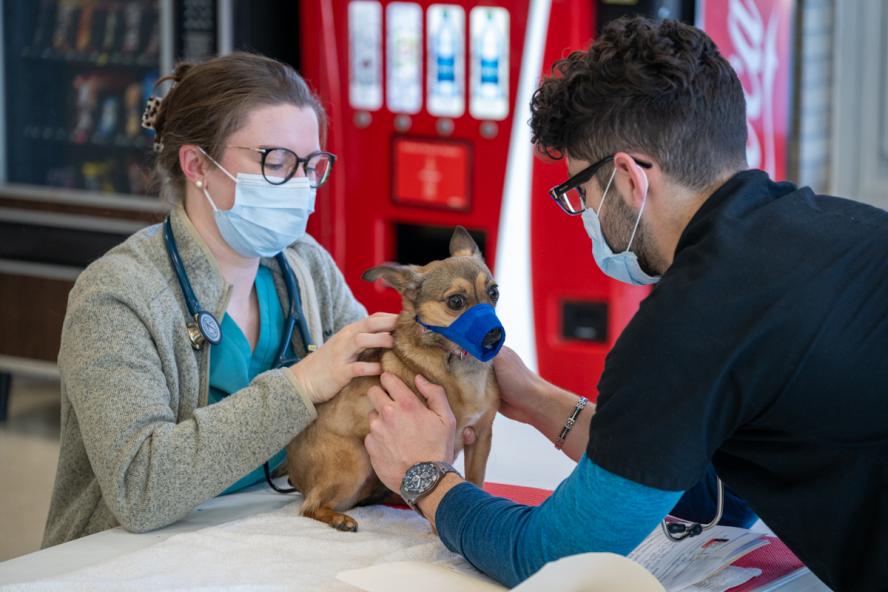Care is provided by Cummings School’s team consisting of volunteer veterinarians, a rotating intern, a veterinary technician, an outreach coordinator, nine second-year Doctor of Veterinary Medicine students, and a volunteer translator. The team provides physical exams, preventative care, and simple grooming, such as nail trims.
A grant from The Irving and Phyllis Millstein Foundation for Animal Welfare® enabled the School to hire a community programs coordinator with a dedicated phone line, create a paid leadership position for a student coordinator, and provide stipends to veterinarians participating in the clinics.
History of the Clinics
An initial grant from the Tisch Fund for Civic Engagement enabled Cummings School to run clinics for the first two years. A collaboration with Becker College (until it closed in 2021) started with one clinic each semester, then transitioned to more frequent clinics. Over the years, student leaders continually sought and received funding — including gifts from the Banfield Foundation and the American Veterinary Medical Foundation, among others — to evolve the program.
Due to the considerable need for services, the clinics were transitioned in 2013 into a “Selective,” as part of the D.V.M. program. Each year, veterinary students choose among more than 40 semester-long Selectives — across the spring, summer, and fall terms — to enhance their education and explore other avenues of interest.
Switching to a Selective format prompted rotating weekly visits to different WHA units that allow pets, followed later by expansion to other locations.
The Team
Dr. Emily McCobb, VG02, V00, joined Cummings School in 2009 and was appointed director of the Shelter Medicine program, established the previous year to care for local underserved animals while providing hands-on learning opportunities for veterinary students.
To create an endeavor that provides better care for the animal and the owner, the program has been formalized and headquartered in Luke and Lily Lerner Spay/Neuter Clinic, where staff maintain client medical records and can collaborate with colleagues at Tufts at Tech Community Veterinary Clinic.
Nancy Meyer served as outreach program coordinator until her retirement in 2023, a responsibility that includes scheduling student participation in the clinics, maintaining records, and responding to calls from public housing clients. “These clinics give students a chance to gain confidence, to get hands-on experience handling animals, and to communicate directly with clients, sharing information respectfully and compassionately,” Meyer explains.
Second-year D.V.M. students Christian Lugo-Fraga (he/him) and Riley Burke (she/her) recognize the benefits of participating in the clinics. “Working at the clinics has helped me improve my sense of empathy toward the patients and their owners,” Christian shares.
Riley agrees and takes her assessment of the experience a step further. “Participating in this clinic has been one of the most rewarding things I’ve done in vet school,” she says. “I’ve learned that the human-animal bond is so strong, no matter who you are or where you’re from.”
Faithful to its roots, students still work together to organize the program and to create and implement the visits. Fourth-year D.V.M. student Elsa Nader (she/her) serves as student coordinator.
“Participating in the clinics is extremely rewarding because you can see the positive effects on people and their pets,” Elsa shares. “As student coordinator, I’ve gained valuable leadership and communication skills and it’s been empowering to collaborate on complex cases to help pets and owners in need.”
Dr. Paula Northrop, a former Becker professor who oversees fieldwork at WHA, attends the weekly sessions and is often joined by Dr. David Schwarz, an adjunct lecturer at Cummings School and president of the State of Massachusetts Animal Resource Team.
McCobb strongly believes in the value of bringing these services directly to where they are needed. “Visiting people where they are, seeing where they live, and learning what they may be dealing with really impacts students, their understanding of a situation, and their compassion,” McCobb contends. “It helps them to cater a treatment recommendation that is feasible for the owner, and make sure they can administer the treatment plan properly to care for their pet.”
Addressing the Need for Accessible Veterinary Care
Across the country, access to care poses a significant problem for many Americans. In 2018, a survey conducted by the Access to Veterinary Care Coalition revealed that 27 percent of U.S. households with pets experienced barriers to veterinary care, with finances the most common issue. Up to 60 million American pets may be affected by this deficit.
“It can be humbling as veterinarians because our services, education, and materials are expensive, but we are increasingly priced well beyond the means of ordinary Americans, let alone those most vulnerable,” McCobb explains.
In addition to grant assistance, relationships with industry partners help clients with free pet food on a case-by-case basis. Vouchers are provided for owners who lack transportation but need additional pet care at either Tufts at Tech or Lerner Clinic. End-of-life care is also addressed via support from the Final Gift Pet Memorial Center. “There is a significant need in this area,” says McCobb. “We offer options for affordable euthanasia and cremation services.”
With generous support from several entities and the dedicated work of compassionate veterinarians and students, Cummings School is making things easier for local animal lovers. In 2024, Cummings School will expand its reach to offer clinics for senior citizen pet owners in Boylston, Grafton, and Worcester.
